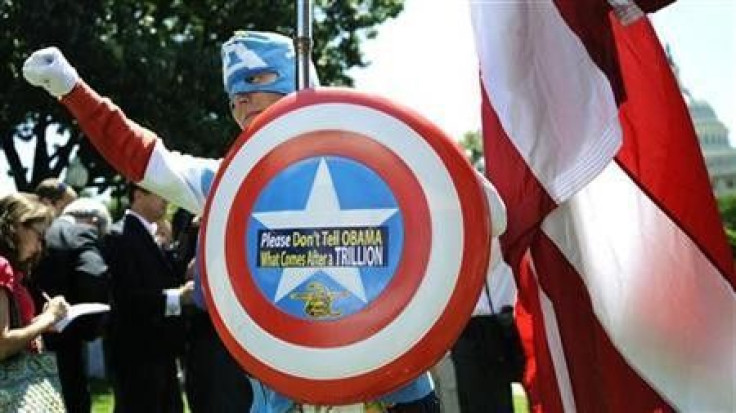Analysis: Tea Party proves clout, but at what cost?

Tea Party conservatives scored their biggest political triumph with a debt-ceiling deal that cuts federal spending, but their hardline tactics could risk a voter backlash in the 2012 elections.
The Tea Party? members who swept into Congress in last year's elections by vowing to slash spending have transformed the Republican Party and raised deficit reduction to the top of Washington's political agenda.
But by pushing the United States to the brink of a debt default and scuttling a more ambitious deal with bigger spending cuts because it included tax increases, they threatened to alienate some of the more moderate voters that Republicans will need to hold power in Congress and recapture the White House in 2012.
"Intransigence can pay off in the short-term, but I'm not sure it plays well with voters over time," said Steven Schier, a political scientist at Carleton College in Minnesota.
"There is a real risk that rigidity and a refusal to compromise will be seen as standing in the way of serious solutions to national problems, and that is the risk for Republicans," he said.
A Pew Research Center poll released on Monday found the contentious debt negotiations had tarnished all of the major players, including President Barack Obama? and Republican House of Representatives Speaker John Boehner.
But Republicans in Congress and the Tea Party fared the worst, with 42 percent saying they had a worse impression of Republicans and 37 percent having a worse view of Tea Party members as a result of the prolonged fight over raising the debt limit.
"In a crowd of people who don't look too good, they are at the top of the list," said Pew President Andrew Kohut.
He said the confrontation recalled the showdown between Democratic President Bill Clinton and Republican House Speaker Newt Gingrich, when Republican threats to shut the government backfired and helped Clinton's re-election drive in 1996.
The loosely organized Tea Party movement, which sprang to life in 2009 after Obama's election, has become a powerful grassroots force that helped elect dozens of new Republicans to Congress last year on promises to curb government.
Many Tea Party followers denounced the debt deal as too weak, and some promised to challenge Republican members of Congress who voted for it in primaries next year.
"I want to push this thing as hard as I can," said Representative Steve King of Iowa, a conservative Tea Party favorite. "If we all of a sudden join hands and sing 'kumbaya,' we concede the position that's gotten us to this point."
TEA PARTY PASSION
Republican consultant Jim Dyke said the Tea Party was instrumental in identifying the issues that fueled Republican election gains last year -- cutting government spending, opposing tax increases and repealing Obama's healthcare reform law.
"That's where the party is, and the passion and the outspokenness of the Tea Party is a helpful part of it," Dyke said.
Democrats were quick to denounce Tea Party-affiliated members of Congress for refusing to compromise, voicing what is certain to be a major talking point heading into the 2012 elections.
"I predict to you that a lot of those new members who came here with 'my way or the highway', they'll either be on the highway or they'll learn that they have to have compromise," Vice President Joe Biden? told CBS News?. "Compromise is not a dirty word."
In a stark sign of the Tea Party's clout, Republican presidential front-runner Mitt Romney? said on Monday he would not support the debt-ceiling deal because it opened the door to higher taxes and put defense cuts on the table.
Boehner was forced to amend his debt bill to win Tea Party support in an effort to find the votes he needed for House passage.
The Tea Party has been a "mixed blessing" for Republicans, said Republican Dan Schnur of the University of Southern California, an aide on Senator John McCain?'s 2000 presidential campaign. "Somewhere between now and November of next year there will have to be a line drawn between energizing the party and electability."
He compared Tea Party followers to the left-wing anti-war activists of the 1960s and 1970s, who changed U.S. policy on the Vietnam War? but helped doom Democratic candidates in the presidential elections of 1968 and 1972.
"They changed the focus and direction of the national debate but sacrificed two elections," Schnur said. "The challenge for Republicans is to figure out how to avoid that fate with the Tea Party."
© Copyright Thomson Reuters 2024. All rights reserved.











